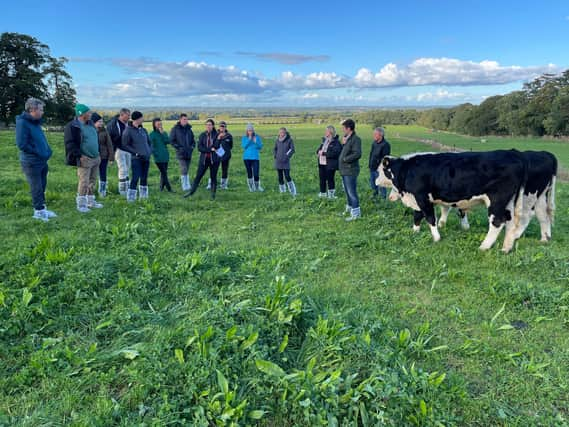Study tour encouraging for multi-species swards for beef and sheep EIP Group


The EIP group, led by AgriSearch and comprising of six beef and sheep farmers from across the province alongside researchers from AFBI and Queen’s University, was formed to investigate the feasibility and practicality of incorporating multi-species swards on NI commercial beef and sheep farms. To date, as part of their ongoing project, the group have all established MSS on farm and so the interest now turns to its management and utilisation, topics on which the group participants were hoping to gain inspiration and guidance at each of the stops on the tour.
The first stop was the Devenish Lands at Dowth where they aim to produce quality beef and lamb through the development of a healthy ecosystem from soil to grass to animals, humans and the planet. One of the areas being investigated is soil health to which MSS has been contributing; improving the soil structure through it’s varied and complex root structures. MSS work at Dowth is led by Cornelia Grace who supervises five PhD students each looking at an aspect of MSS in greater detail as part of the Heartland Project. While the project is still ongoing, experience to date has been extremely positive with MSS displaying a significantly reduced need for manufactured fertiliser alongside positive production qualities, with lambs reared on MSS exclusively from birth found to require fewer days to slaughter; both of which are contributing to a reduction in overall carbon footprint.
Advertisement
Advertisement
The second stop of the day was a visit to the UCD Lyons Research Farm outside Dublin where MSS has been incorporated into their long-term grassland experiment platform where the focus is on increasing environmental and production efficiency of a traditional dairy calf-to-beef farm system. MSS plots were established in 2019 alongside perennial ryegrass (PRG) and PRG/White Clover (WC) Swards for comparison. Since grazing commenced animal liveweight gain has been recorded monthly and herbage production weekly. Interestingly silage was also produced from all swards and fed to each animal batch over winter to maintain the diet over their lifespan. Outcomes to date show a reduction in days to slaughter from both the MSS and PRG/WC swards despite a significant reduction in fertiliser being applied to each in comparison to the PRG sward for both grazing and silage. Following some great discussion with the team at UCD on the practicalities of MSS management, day one concluded with a stay at Enniscorthy, Co. Wexford with much conversation on the events of the day.
Day two of the study tour started with a visit to Teagasc’s Johnstown Castle site near Wexford town where a number of research projects have been taking place. The group visited both the beef and dairy MSS sites as well as the plot trial area. The group were joined on this visit by a number of other farmer and industry groups from across Ireland and it was encouraging be able to exchange ideas and see the interest in MSS increasing. It seems that for many it is a desire to reduce fertiliser inputs that is driving this trend. Whilst MSS will allow for this, as exhibited at the two sites visited the previous day, work at Johnstown castle has shown that clover management within the MSS sward is key. The plot trials at Johnstown castle also provided some thought provoking results with mixed swards shown to be considerably more resistant to weed pressure, able to produce higher or matched yields depending on the fertiliser rate applied to the PRG, and shown to be yield stable in drought conditions (6-species mix). Overall MSS has been shown to be of high relevance when considering sustainable intensification.
The final stop on the study tour was a visit to a commercial dairy farm that has been working in partnership with DLF Seeds Ltd. Kevin O’Hanlon manages the 340 acre farm and has recently converted to organic production. At the centre of his efforts is the use of MSS having trailed numerous mixes and establishment methods over the last few grazing seasons. Kevin provided much practical advice to the group, highlighting both the realities of establishment and management but also the benefits he has seen since starting his journey including improved milk production and reduced inputs. Milk yields improved by 2 litres per cow per day when they were grazing the MSS (compared to pure PRG swards). Establishment methods were widely debated with the consensus that whilst one method may work for one farm it might not work on another, choosing wisely based on your own farm conditions and your own expectations is key.
Following a busy and informative two days the group was left encouraged that their work on MSS to date is in-line with much of what is taking place elsewhere in Ireland at present. Each visit gave the group much to discuss and many ideas to take forward into the next stages of the project.
For regular updates on the progress of the Multi-Species Swards for Beef and Sheep EIP project follow the AgriSearch Facebook page and Twitter feed.